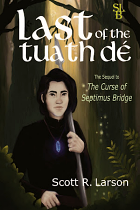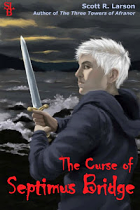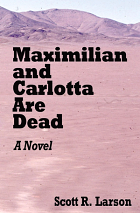Woo Who!
The last day or so I have been thinking about what a Babylon 5 feature film might be like at this point.
Now, it’s been ages since I’ve heard or read even unfounded speculation about a B5 movie. I follow B5 creator/guru J. Michael Straczynski on Facebook and he freely discusses all types of projects he is involved with, but I cannot remember the last time he mentioned a prospective B5 movie—even to strike down an untrue rumor. Still, I cannot help but speculate on what such a movie might be like at this point. After all, it’s already 13 years since the series itself ended and nearly ten years since the last spinoff TV movie premiered on the small screen. (A couple of straight-to-DVD stand-alone episodes, called Babylon 5: The Lost Tales, appeared four years ago.)
Why would I expend mental energy on what is clearly a futile notion? Well, because it’s the only one of my favorite all-time TV shows waiting to have a big screen version announced. Principal photography has finished on Tim Burton’s Dark Shadows movie, and we now have only to wait until May to see the results. And in just the past few days every source from Variety to The New York Times to BBC radio itself has been verifying that work is beginning on a Doctor Who feature film.
Ever since I started seriously paying attention to Doctor Who, there have always seemed to be rumors about a big screen movie. And until now the rumors have never gone anywhere. They usually peter out on their own due to a lack of any firm information or crash because of categorical denials from the TV show’s producers. But now we have English director David Yates—whose claim to fame is now having helmed the final four Harry Potter films—talking openly about plans to make a Doctor Who movie.
To be clear, just because a filmmaker has undertaken to make a movie doesn’t necessarily mean that that movie will ever see the light of day (or the dark of cinema). Most projects like this never result in anything. On the other hand, if the BBC and an A-list director like Yates are behind it, then this one has a better shot than most. It’s okay to give ourselves permission to get excited. Still, even if the movie gets made, its premiere is at least several years away, so it’s probably not worth getting too excited.
Given how fresh this news is, it’s amazing how much detail we already have. We have a director, although, as these things go, that could certainly change by the time cameras start rolling. And we know that the movie will have no connection to the ongoing TV series. Apparently, the Doctor will not be played by TV’s eleventh Time Lord Matt Smith or by tenth TV Doctor David Tennant (frequently rumored to be the star of a Doctor Who feature film). And its story will not tie into any ongoing story arc on the small screen. In other words, this will be a reboot.
There is precedent for this. In the mid-1960s, when Doctor Who was still a fairly new TV series (and around the time Patrick Troughton took over the starring role from William Hartnell) there were a pair of feature films starring Hammer horror legend Peter Cushing. The titles were Dr. Who and the Daleks and Daleks’ Invasion Earth: 2150 A.D. Despite the presence of a character named Dr. Who and the popular Daleks from the TV series, these movies had absolutely no connection to the TV series. For one thing, in the movies the good doctor was a human being from earth and not a Time Lord from the planet Gallifrey. For another, our hero actually had the surname Who, i.e. he was literally Dr. Who. As all true fans know, the real Time Lord is simply known as “the Doctor.” The word “who” appears only in the title and occasionally in clever bits of ironic dialog. (“Doctor? Doctor who?”) While TV’s Doctor traveled in a TARDIS (acronym for Time and Relative Dimension in Space) from Gallifrey, the movie doctor invented his own time and space machine by tinkering around in his own humble basement—as one does.
Today those movies are more like a footnote to the saga of Doctor Who and certainly not considered canon. (How could they be?) And it seems inevitable that Yates’s movie won’t be canon either. Not unless the writers bother to find some clever way to fit it in, in the same way that J.J. Abrams’s Star Trek went to the trouble of explaining that it was taking place in an alternate time line and connected to the old TV series and previous movies by including Leonard Nimoy’s old Spock as a link. At this point, it doesn’t sound like Yates is thinking along those lines.
But why does it matter whether the movie fits into the established Doctor Who canon anyway? It’s just a movie, right? Shouldn’t it just exist and succeed or fail on its terms? Theoretically, yes. But properties like Star Trek and Harry Potter and Dark Shadows and The Lord of the Rings and Doctor Who all have something called a fan base. This refers collectively to the individuals who are enthusiastic (if not fanatic) about the characters and stories and (inevitably) the continuity of these works. Normally, a fan base does not consist of enough people to, on their own, make a major motion picture profitable—even if they go to see the movie multiple times. But they can be crucial at giving a movie a jump start in its opening weekend and spreading the crucial word of mouth to get non-fans into the cinemas. From a business point of view, it may not be completely cost effective for screenwriters to placate the fan base (too much fidelity to canon can have the effect of confusing non-fans), but alienating the fan base can be crippling to a film’s commercial prospects. It can be a tricky fence to straddle.
The gold standard for a filmmaker (mostly) appeasing a rabid fan base while making a very successful series of movies has to be Peter Jackson. He wisely vetted what he was doing with the fan community of Lord of the Rings and the resultant trilogy, while not without compromises necessitated by the limits of cinema, paid enough attention to the source books’ details to avoid alienating fans. Arguably, the various filmmakers of the Harry Potter series (including David Yates) could also make a serious claim to that gold standard. Yates’s task with the Doctor Who movie will be trickier because he is not simply adapting a beloved novel or series of novels. He will be working with material based on a TV show that will presumably still be airing at, or around, the same time as his movie. But presumably a base of fans who have spent years or decades watching their hero being recast every few years and having his stories pulled in different directions by successive showrunners are not going to be so put off by a complete reboot that they won’t turn out to see something new and shiny with the name Doctor Who on it.
What will be interesting is to see how Yates goes about making the story accessible to all of the unwashed who don’t live and breathe Time Lord lore. Sure, I went to see all his Harry Potter movies, but in some cases I was dragged against my will.
-S.L., 17 November 2011
If you would like to respond to this commentary or to anything else on this web site, please send a message to feedback@scottsmovies.com. Messages sent to this address will be considered for publishing on the Feedback Page without attribution. (That means your name, email address or anything else that might identify you won’t be included.) Messages published will be at my discretion and subject to editing. But I promise not to leave something out just because it’s unflattering.
If you would like to send me a message but not have it considered for publishing, you can send it to scott@scottsmovies.com.





















